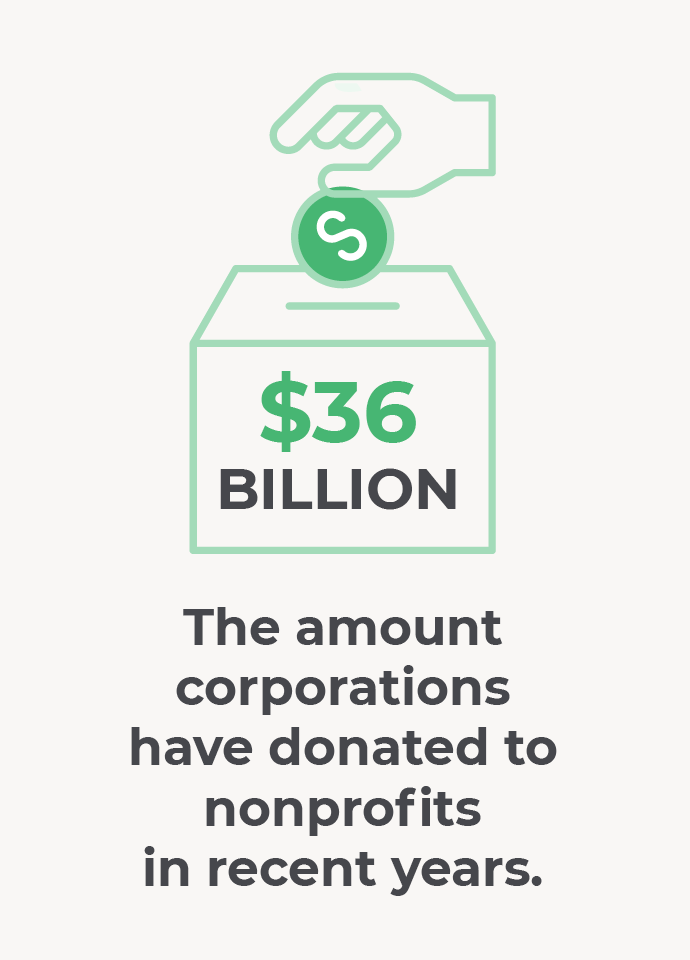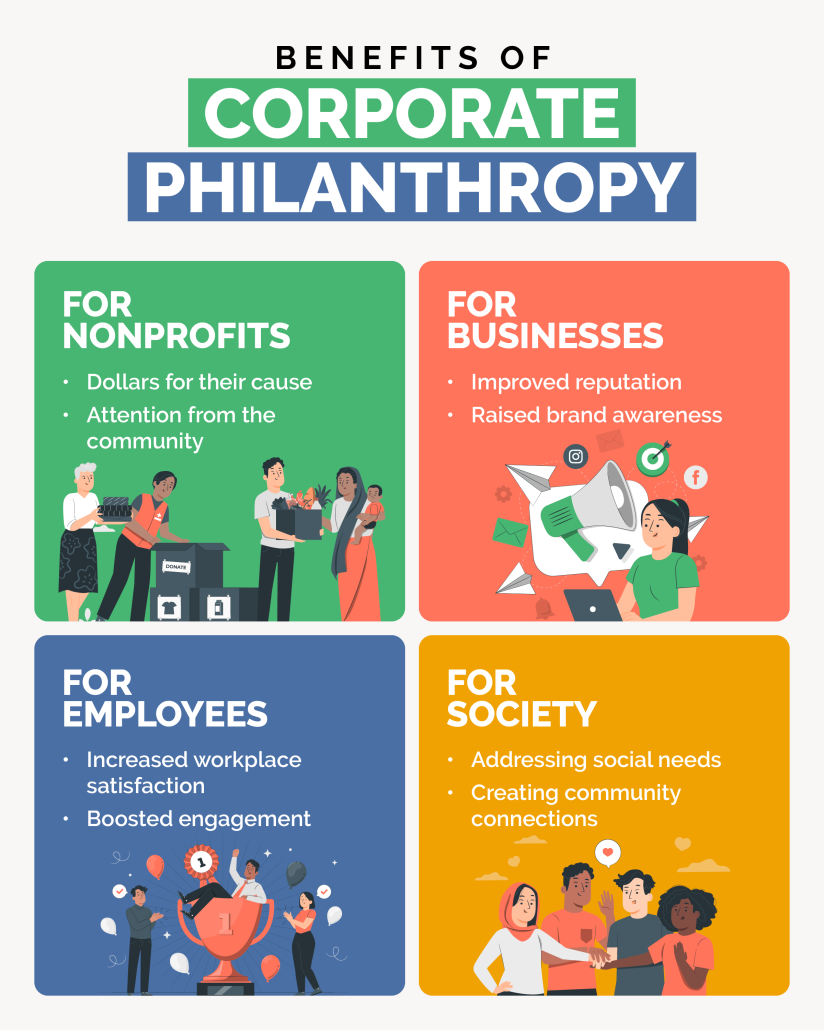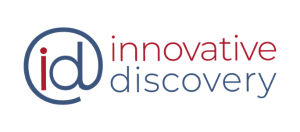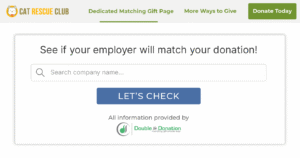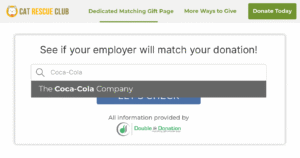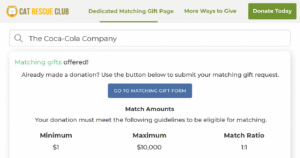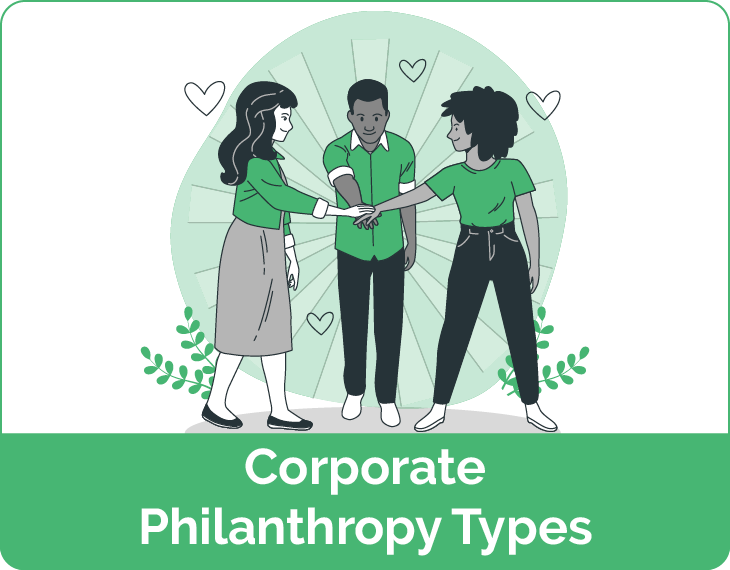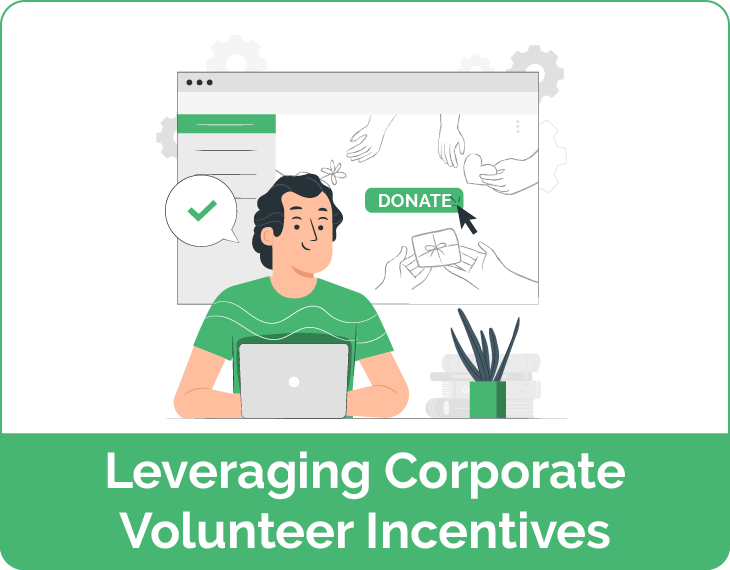What is corporate social responsibility?
Corporate social responsibility (CSR) describes a company’s efforts to be a good corporate citizen and improve society. Common examples of CSR programs include donating cash and in-kind goods to nonprofits, providing grants for employee volunteer hours, implementing grant programs, changing production or purchasing processes to benefit environmental or social justice causes, and committing to diverse hiring practices.
Who does CSR impact?
CSR impacts companies, nonprofits, employees, and society as a whole. Corporate social responsibility is not a mandated practice in the United States, but something extra that companies do to improve their local and global communities.
What is the purpose of corporate social responsibility?
By investing in social, environmental, and community-driven initiatives, companies can make a positive impact while strengthening their brand, engaging employees, and building long-term customer trust.
Corporate social responsibility programs structure a company’s efforts to give back to the community, participate in philanthropic causes, and provide positive social value. Because social responsibility is not a mandated practice, it can function as a powerful differentiator for companies that participate, helping them build positive brand images.
How can CSR programs help nonprofits?
When companies invest in CSR initiatives, they often look for nonprofit organizations to support through financial contributions, employee volunteerism, in-kind donations, cause marketing campaigns, and more. As a result, corporate social responsibility programs provide valuable opportunities for nonprofits to access new resources and build long-term partnerships with businesses that share their mission.
How much money has been donated as a result of corporate giving?
Corporate giving is a major source of funding for nonprofits, contributing billions of dollars annually to support charitable causes. Reports show that corporations gave $44.04 billion to nonprofits in 2024.
Companies donate through a variety of programs, including direct corporate philanthropy, matching gifts, volunteer grants, sponsorships, and even in-kind contributions.
How does CSR relate to ESG?
CSR and environmental, social, and governance (ESG) are two frameworks that guide businesses that promote ethical, sustainable, and responsible operations. While they share similarities, they have distinct focuses and applications.
More specifically, CSR is a company’s voluntary commitment to social good. It includes philanthropy, ethical labor practices, sustainability efforts, and community engagement. Meanwhile, ESG is a measurable framework used by investors to evaluate a company’s environmental, social, and governance practices to assess risk, sustainability, and long-term financial performance.
CSR Statistics: What You Need to Know
Individuals work for companies with matching gift programs.
Of Fortune 500 companies offer volunteer grant programs.
Is donated in cash to nonprofits by the top 10 corporations annually.
Is donated through matching gift programs each year.
Of corporate donations are made through matching gift programs.
Of employees believe companies must lead with purpose.
Of consumers want to buy from companies making the world a better place.
Of people want to know about a company’s CSR efforts.
Source: Double the Donation Research
Benefits of Corporate Social Responsibility
For Nonprofits
CSR initiatives help nonprofits find support beyond individual donors. Companies with strong corporate social responsibility programs are looking for nonprofits to receive their support in the form of grants, matching gift programs, and volunteer grants.
For Businesses
Research shows that consumers are more likely to purchase goods from companies that are socially responsible. Businesses can improve their brand reputation through CSR when they’re acknowledged in a nonprofit’s marketing materials or even featured on those organizations’ donor recognition walls.
For Employees
Employees like working for companies that have positive public images and make the news for positive reasons. Employees who are proud of their company’s CSR efforts are more likely to be engaged at work and feel loyalty to their current employer.
For Society
CSR is a thoughtful and practical way to give back to society. When businesses are conscious of their social and environmental impact, they can benefit the world around them and help find solutions to everyday issues.
Types of Corporate Social Responsibility
Corporate Philanthropy
Corporate philanthropy involves businesses promoting the welfare of others through charitable donations of funds or goods. For instance, event sponsorships in exchange for non-tangible perks like publicity are a common form of corporate philanthropy.
Businesses can leverage this type of CSR in various ways, and one of the most popular methods is by matching gifts their employees make to nonprofits. Corporations that offer matching gift programs essentially double the donations that their employees give to eligible organizations. This approach allows employees to guide the business’s philanthropic priorities while driving extra impact for their favorite causes—a win-win-win!
Corporate Volunteerism
Many corporations encourage their employees to volunteer as part of their CSR programs. Some encourage involvement by offering volunteer grants to the nonprofits where their employees give their time, while others provide employees with time off specifically for volunteering.
This kind of socially responsible program benefits every party involved. Employees volunteer and donate their time to important causes in their communities, and nonprofits receive free time and volunteer work. Not to mention the reputation boost businesses can earn as they support local missions!
Environmental Leadership
Corporations can demonstrate environmental leadership by:
- Reducing their carbon emissions
- Incentivizing recycling their products
- Making environmentally-minded changes to their supply chains, vendors, and partners
- Updating their production processes to incorporate recycled materials
- Donating to environmental causes
By showing that they care about improving and preserving the environment, companies can gain support and build a reputation as environmental leaders.
Ethical Labor Practices
Part of being a socially responsible corporation means using ethical labor practices. These practices can include:
- Offering employees competitive salaries and compensation packages
- Providing generous parental leave
- Offering tuition reimbursement and student loan repayment support
- Cooperating with employee unions
- Establishing governance and policies to prevent corruption and conflicts of interest
- Reviewing supply chains and partnerships to cut ties with organizations that use unethical practices
- Transitioning to employee-owned models
Following ethical labor practices is a key part of the CSR pyramid, a framework for how businesses can implement socially responsible programs fairly and sustainably.
Economic Responsibility
In being economically responsible, companies “pay their dues” to society. This is often done by:
- Keeping up with their taxes
- Investing back into their communities
- Providing financial transparency
- Paying their employees competitive wages
- Avoiding pay discrepancies
- Investing in businesses and startups that further social, environmental, or economic good
Companies that take part in economic responsibility serve as role models for how large businesses can make a positive impact.
Corporate Social Responsibility Programs to Know
Corporate Grants
Some corporations offer monetary grants to organizations whose missions and projects align with theirs. To acquire these grants, nonprofits must complete an application process, where they present a case for support and prove they meet the company’s requirements. The business will then choose one or more nonprofits to award the grant to and disburse the money from a designated fund.
However, there are also a few rare non-competitive grant programs that provide funding to almost every 501(c)(3) that applies. For instance, the Google Ad Grants program supplies any and all eligible nonprofits with $10,000 each month to use on its paid advertising platform. If you meet Google’s criteria, you’ll receive the funding!
Volunteer Grants
Volunteer grants are a form of corporate giving that encourages employees to volunteer in their local communities. Companies then provide monetary grants to organizations where these employees regularly volunteer based on their verified volunteer hours. These programs enable businesses to accomplish two goals at once: giving back through CSR and fostering a strong internal culture.
Here’s what your nonprofit should know to tap into volunteer grants:
- 40% of Fortune 500 companies offer volunteer grant programs.
- 80% of companies with volunteer grant programs offer between $8 and $25 per hour volunteered.
- 66% of surveyed companies also provide paid-release time volunteer programs.
Volunteer grants help nonprofits meet their volunteering and fundraising goals at the same time. Like with matching gifts, nonprofits can use tools like Double the Donation and its volunteering module to identify volunteers who may be eligible for these programs.
Matching Gifts
Matching gifts are a type of corporate philanthropy in which companies match donations that their employees make to nonprofit organizations.
After an employee donates, they’ll complete an application requesting a matching gift from their employer, who then makes a separate donation. Companies usually match donations at a 1:1 (dollar-for-dollar) ratio, but some will match at a 2:1, 3:1, or even a 4:1 ratio.
Matching gifts are also growing in popularity:
- 65% of Fortune 500 companies offer matching gift programs.
- 84% of donors say they’re more likely to make a donation if a match is offered.
- 1 in 3 donors indicate that they would give a larger gift if a match were applied to their donation.
- 11% of total corporate cash contributions come from corporate matching gift programs.
All in all, matching gifts can make a huge difference in nonprofit fundraising as well as employee engagement. Nonprofits can use database and screening tools to identify donors who are eligible for donation matches.
How To Create Lasting Partnerships With Companies
CSR programs offer nonprofits valuable opportunities to build lasting relationships with companies.
Through grant programs and employee volunteers, nonprofits can build inroads with businesses that will pay dividends. Special workplace giving programs, event sponsorships, in-kind donations, and more can all grow over time as both organizations see increased value in their partnership.
Businesses might also aspire to secure B-corp, ISEAL, SASB, or CLMA certifications (attained through recognized third-party impact assessments) to cement their reputations as socially responsible organizations. Having long-term nonprofit partners that can attest to the impact and reliability of their support can be immensely helpful for these certification processes.
If your nonprofit has received support from a company through its CSR programs, here are three recommendations for strengthening that relationship:
Personalized eCards
Go a step beyond the traditional thank-you email with personalized eCards! These virtual cards communicate your appreciation for your corporate sponsors in a visually engaging way. After all, who doesn’t love receiving a thoughtful card?
Your team can either share one-off thank-you eCards or continue sending them out for special occasions. For example, design holiday cards. Then, create a personalized message to send along with it to each of your partners.
This can be a cost-effective way to show corporate partners you’re thinking of them and value their support. The year-end season is an opportune time to reach out as companies reflect on the past year. Backed by digital greeting card tools, you can craft compelling designs that communicate your gratitude year-round.
Gift Baskets
For your most generous corporate partners, you might send a gift basket after wrapping up a big campaign they supported. Just like with eCards, the holiday season is the perfect time to send gift baskets as well!
To send gift baskets, your nonprofit can either:
- Choose a company that creates gift baskets and will handle shipping for you.
- Create your own gift baskets that include items like branded merchandise.
Either way, this is a great way to thank your committed corporate partners for supporting your mission.
Social Media Shoutouts
If you have a limited budget, experiment with zero-cost recognition strategies like social media shoutouts. Create posts thanking sponsors and partners for their support, and don’t forget to tag their company’s official accounts.
Plus, by publicly thanking companies, you might generate extra publicity for your cause. Companies share your posts on their own pages to show off their good deeds, getting your cause in front of their customers.
Companies With Strong Corporate Social Responsibility
Let’s take a look at some well-known companies with particularly standout social responsibility programs.
Businesses can take inspiration from these offerings as they craft and refine their own CSR program, and nonprofits can seek corporate partnership opportunities with mission-focused businesses!
| Company | Annual Giving Information | Learn More |
| Chipotle | CLMA-certified employee matching gift program | Chipotle’s CSR program |
| Checkr | CLMA-certified employee matching gift program | Checkr’s CSR program |
| Toyota Connected | CLMA-certified employee matching gift program | Toyota Connected’s CSR program |
| Walmart | $25,000 maximum match per executive-level employee $10 per volunteer hour | Walmart’s CSR program |
| Wells Fargo | $5,000 maximum match per employee $2,000 maximum volunteer grant per employee | Wells Fargo’s CSR program |
| Microsoft | $15,000 maximum match per employee $25 per employee volunteer hour | Microsoft’s CSR program |
| Apple | $10,000 maximum match per employee $25 per employee volunteer hour | Apple’s CSR program |
| $10,000 maximum match per employee $10 per employee volunteer hour | Google’s CSR program | |
| Boeing | $10,000 maximum match per employee $100 per 10 employee volunteer hours | Boeing’s CSR program |
| ExxonMobil | $500 grant after 20 hours of volunteering | ExxonMobil’s CSR program |
| Chevron | $10,000 maximum match per employee $500 per 20 employee volunteer hours | Chevron’s CSR program |
| Starbucks | $1,000 maximum match per employee Up to $1,000 for employee volunteering | Starbucks’ CSR program |
| Verizon | $6,000 maximum match per employee $750 per 50 employee volunteer hours | Verizon’s CSR program |
Walmart
Walmart donates more than $1.7 billion in cash and in-kind donations globally each year. Walmart also donated $16 million to disaster recovery and preparedness efforts, as well as over 665 million pounds of food to Feeding America.
Google has consistently led the tech pack in its CSR efforts. Among its many goals is helping close the world’s education gap by supporting nonprofits that build platforms to scale digital learning resources. Google has also donated over $40 million and 50,000 pro bono hours to racial justice causes since 2015, plus over $100 million and another 50,000 volunteer hours to pandemic recovery and preparedness since 2020.
Not to mention, they offer Google Ad Grants, giving eligible organizations free access to their paid advertising platform. Since 2003, they’ve awarded more than $10 billion in free advertising to over 115,000 nonprofits in 51 countries.
Microsoft
Microsoft strengthens communities all over the world with its diverse industry-leading CSR programs. One extremely popular program provided discounts and grants to over 300,000 nonprofits to secure updated technology in 2022. Microsoft has also helped lead the charge in developing standards for responsible AI usage.
Innovative Discovery
Innovative Discovery has established a breakthrough matching gift program using Double the Donation’s auto-submission functionality. Plus, the company participates in CSR by offering VTO (or paid volunteer time off), volunteer grants, employee fundraising campaigns, nonprofit sponsorships, and more.
Offers Matching Gift Auto-Submission
Checkr
Checkr participates in corporate social responsibility by giving charitably to the organizations their employees believe in (made quick, easy, and accessible with matching gift auto-submission through Double the Donation). Not only that, but they work with the mission of advancing fair hiring practices and offer assistance through expungement and reentry services for post-incarcerated individuals.
CSR Software for Nonprofits and Companies
Both businesses and nonprofit organizations have roles to play in corporate social responsibility programs. There are several software solutions that help both types of organizations access and make the most of these opportunities.
In the end, the critical purpose of each software revolves around simplifying and increasing participation in corporate giving initiatives. Remember, all stakeholders benefit from maximal program usage.
Here’s what you should know about each type of technology:
CSR Software for Nonprofits
Nonprofits can increase their revenue by promoting matching gifts and volunteer grant programs to their supporters. Through these CSR programs, donors can often double their contributions, and volunteers can make an even greater impact with their time.
Double the Donation can help both nonprofits and employees take advantage of these CSR opportunities.
More than 8,500 organizations use Double the Donation, making it the world’s #1 matching gifts and volunteer grant database. As the most comprehensive and up-to-date CSR resource, both nonprofits and corporate employees can access thousands of company profiles to leverage CSR opportunities like matching gifts, volunteer grants, in-kind gifts, and payroll giving initiatives.
How the Database Works
STEP 1:
The donor sees the company search tool on your nonprofit’s website, giving them access to the matching gift database.
STEP 2:
The donor types the name of their employer into the auto-completing company search tool.
STEP 3:
The donor views all of their employer’s matching gift information, forms, and guidelines. Plus, they’ll also get details about corporate volunteering, payroll giving, and corporate sponsorship opportunities.
In addition to providing access to the industry’s most comprehensive corporate giving database, Double the Donation also allows organizations to increase engagement and funds through automated and personalized donor outreach.
By triggering follow-up emails after an individual makes a donation, they’ll deliver targeted messages with employer-specific program criteria and direct links to next steps for submitting their matches.
This empowers organizations to drive eligible matches to completion by ensuring every donor is exposed to matching gift opportunities, including those who would otherwise not know if they qualify for a program.
CSR Software for Companies
CSR software helps business organize their CSR programs. CSR software designed for companies streamlines the giving and volunteering process into one central system, making it easy for employees to participate and for companies to manage!
For example, CSR software helps companies:
- Manage employee donations
- Review and approve matching gift requests
- Coordinate and promote volunteer opportunities
- Log volunteer hours
- Review and approve volunteer grant and matching gift requests
- Communicate employee giving impact
When companies choose the right CSR software to manage their giving programs, they can make a positive impact on society, boost their reputations, and engage employees. It’s also great for nonprofits because they get to benefit from those programs as more employees participate.
Today, corporate-focused CSR platforms are working with Double the Donation to enable powerful auto-submission functionality. This new option further streamlines matching gift requests for employees by tightening partnerships between charitable-minded companies, their employees, and the nonprofits they support.
Additional CSR Resources
Corporate Social Responsibility presents a valuable opportunity for nonprofits to engage businesses as mission-driven partners in creating positive change. As more companies prioritize social impact through charitable giving, employee volunteer programs, sustainability efforts, and corporate philanthropy, nonprofits can leverage these initiatives to secure funding, build relationships, and expand their reach.
By understanding how CSR works and identifying businesses that align with your mission, your nonprofit can unlock new corporate partnerships that provide financial support, volunteer engagement, and long-term collaboration. As CSR continues to evolve, nonprofits that proactively seek out and cultivate corporate relationships will be better positioned to increase their impact and drive meaningful change in their communities.
Looking to learn more about corporate philanthropy and beyond? Check out these additional recommended resources:
Types of Corporate Philanthropy
There are many types of corporate philanthropy, and understanding the opportunities available to you can go a long way. Uncover more about innovative corporate giving programs in this guide.
Corporate Volunteer Incentives
Get more registrants to your volunteer events by making the most of corporate volunteer programs. Learn more about leveraging these powerful incentives with our free downloadable guide!
Guide to Corporate Matching Gifts
Matching gifts are a popular form of corporate social responsibility. Uncover everything you need to know about the programs to raise more and better engage your donors here!



